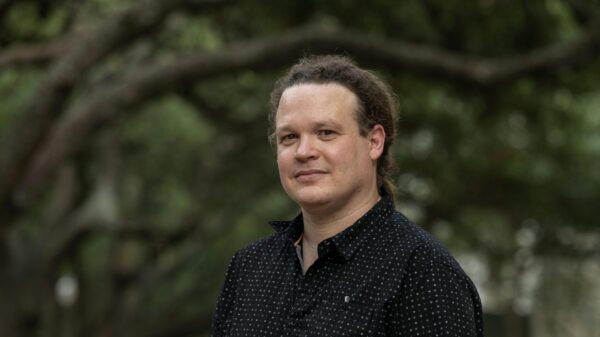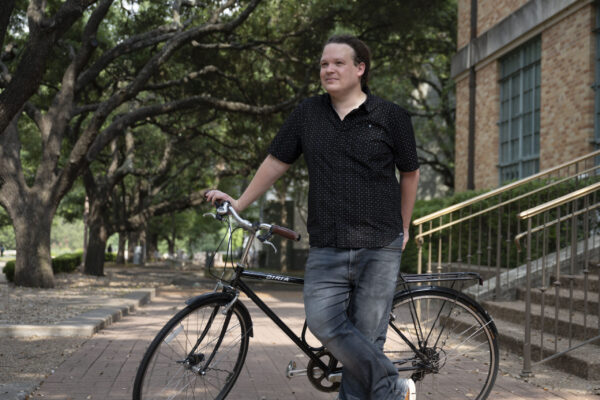When Rich Murphy was 11, he took an exam everyone in the English county of Kent still takes. The test determines whether a student goes to a selective high school or a regular high school. He scored well enough to attend the selective school. He went on to attend college, and then graduate school, eventually earning a Ph.D. in economics.
At an economics conference in Munich, a professor who heard him speak invited him to apply to teach at a university in a city he had never heard of: Austin, Texas. Now in his eighth year of teaching and researching the economics of education at The University of Texas at Austin, Murphy was recently promoted to associate professor.
But here’s the thing: 11-year-old Murphy scored just high enough to be admitted to a selective high school, where the science teachers all had Ph.D.s., and the presumption was that all students would go to college. But what if his mind had wandered at a crucial moment and he had missed, say, two more questions? Would he even have gone on to college? And had he not gone to college, what would his current life be like, from his salary to his worldview?
Had he indeed missed those two questions his score would have put him at the top of the regular high school. How would that have affected his psychology, performance and aspirations? Like tiny differences in the angle of a golf-club head, the difference in results 300 yards away can be immense.
These “what if” questions, known as counterfactuals, are at the heart of Murphy’s teaching and research in the field of the economics of education.

Murphy grew up in Herne Bay on England’s southeast coast, its pebble beaches facing the North Sea. “It’s very quaint. It’s wonderful to go back,” he says. His mother worked in the home, and his father was an engineer who traveled widely for his work with zinc and copper mines; at age 4, Rich lived in Zambia but naturally doesn’t remember much besides the giant fruit bats.
Murphy’s fascination with education began with a basic curiosity about the “natural experiment” found in his own life: He is the oldest of three brothers, and the younger two did not score high enough to follow him into the selective high school. “I remember coming back from university, and my brothers having hardly any homework. Their grades weren’t very good. It just seemed like a very different setup.”
His middle brother stopped attending high school at 16, when compulsory education ends in the United Kingdom, and entered the sort of apprenticeship that has populated Britain’s skilled-labor class for centuries. His youngest brother did the same, but after a year in the workforce, returned for the final two years of high school, then earned a degree at the local university. Both live in Herne Bay to this day within 2 miles of their parents and all their aunts and uncles.
There is clearly nothing wrong with this situation, and indeed it has its own great advantages — close relationships between grandparents and grandchildren, support for parents as they age, friendships with cousins, the continued viability of small towns. And yet, Murphy still is curious about what might have been had things gone slightly differently with their education.
“If I’d gone to the comprehensive (regular) school, I don’t think I’d be here,” he said. Social norms and expectations are powerful. “Once you’re in a setting, the way that you think about the world and the way that you think about your life ahead adjusts. If you don’t think you’re going to university, because none of your friends are going, then why should you study and get good grades? Just go to high school, then get an apprenticeship. Whereas in my peer group, there was a press from my teachers and my peers. It’s the expectation. ‘I got a bad grade. Oh no!’”
His longest-running research — dovetailing with his personal story — is about how rank among peers in elementary school affects you during high school, in college, and in the labor market. “A kid may score an 80 on a test. What we find is that if an 80 puts them at the top of the class rather than in the middle, they’re much more likely to do better in high school, go to university, and have a high-paying job. They’re the same person, but they’re interacting with different people.”
The Economics Department at UT is obviously excellent. It’s one of the best in the world, especially for the type of research I want to do."
He says, “I tell my students it’s impossible to find out what our alternative selves would be like in an alternative universe. So what we do is look for natural experiments, things that come about that mean that people are pushed on different paths not through their own intrinsic motivations but through random chance. Then if we aggregate that up enough — to a state or national level — we can argue that kids on one side of the threshold are very similar to kids on the other side of the threshold but that only varied from chance.” That is when one can argue for policy changes with the confidence that they will produce the desired effect, he says.
* * *
Though we tend to think of economics as the study of the flow of money, only part of Murphy’s work deals in dollars and cents (or pounds and pence). He is just as likely to be studying whether the presence of cellphones in classrooms negatively affects grades. (Spoiler alert: They do.) Indeed, Murphy could be plucked out of the Department of Economics and dropped into the Department of Sociology, the College of Education, or the LBJ School of Public Affairs, and his work would seem just as good a fit.

Since Murphy is a product of the British education system, it is natural that his early research deals extensively with that system and that even his current work uses differences between it and the American system to illuminate the effects of differing policies. Here is a sample of his observations:
Free College vs. Tuition
In at least one regard, the British higher education system has moved closer to the American: in just two decades it has gone from free to one in which tuition is among the highest in the world. The effect has been that per-student spending by universities increased and that the educational gap between rich and poor decreased.
What explains this somewhat surprising finding? Before, everyone had access to free education, but only the well off used it because the others couldn’t afford the associated costs of attending college — living expenses and the cost of not working in order to attend. “The main issue in higher education is liquidity,” Murphy says, “cash on hand.”
In the English system, despite now charging tuition, there is no upfront cost to students because the government provides a loan big enough to cover tuition and living costs. This loan is then paid back like a tax on graduates, a percentage of their now increased income. “If there is a shock like unemployment, the graduate is not on the hook for a loan repayment; they’re only paying if they’re making money,” he explains, and even then, they are only paying a portion of their education cost, which is still heavily subsidized by the national government.
College Is Only Valuable If . . .
Asked if he thinks everyone should go to college, he quickly answers no. “College is a place where you learn very specific skills. Some people will get a lot out of it and some people won’t. There may be an argument that the current K-12 system under-provides for certain students who, if they had been invested in appropriately, would have gotten a lot out of college. But by the time they finish 12th grade, they don’t have adequate preparation to get a lot out of it. So it’s on the policymakers to not encourage those people to go to university but to change the system in the first place to improve K-12 so they are prepared.
“During COVID I was bored and needed to get out of the house, so I cycled all the way to Mozart’s (Coffee Roasters) on Lake Austin. On the way, I noticed there was a golf course. I found out it’s a municipal golf course and is quite cheap, which is great. But I don’t have the skills to golf, and if I don’t know the golf course exists, then I’m definitely not going to use it.” That’s like college, he argues: If it exists, but students haven’t been prepared with the skills to take advantage of it, then, for them, it might as well not exist.
Additionally, he says, “It’s really hard for students to ascertain the quality of an institution before they go there, and even when they are there, they still don’t know if they’re getting a good education or not until they’re out in the labor market. I tell my students, ‘You probably don’t know that this is very useful for you, but in a few years’ time, you’ll say this was quite a good course.’”
Narrowing High School Focus and Late College-Entrance Tests
Another major difference between the American and British systems is that in the final two years of high school in the U.K., the focus narrows to just three subjects. By the time students get to college, they are basically done with their prerequisites and “you hit the ground running at university.” Murphy’s own curriculum narrowed to math, physics and economics.
Yet another major difference is that in the U.K., students take their college-entrance exams in the final two months of high school, which keeps their motivation high. In the U.S., SAT and ACT exams that determine college acceptance are typically taken in the junior year or early in the senior year. This produces a “relaxed” senior year, which might be great fun but does not motivate continued striving to learn.
The ones who are engaged will continue learning, “but those aren’t the ones the policymakers need to worry about.” he says. “We need to imbue the others with a passion for education. We can do that by setting incentives: If you do really well your final year, you can make better grades and get into the university you want to get into. Maybe through that learning and trying hard, you actually start enjoying the subject instead of thinking, ‘I don’t really need to do this.’”
National K-12 Funding.
In the U.K., every school gets funding from the national government on a per-student basis, and if a student is from a disadvantaged background or has special educational needs, the school gets more money.
“There’s an incentive for schools to enroll students from different backgrounds,” Murphy says. “In the U.S., school funding relies on property taxes, which means you get a vicious circle: A school does well, people want their children to go to that school, house prices go up, the tax take increases, the school gets higher funding, the rich get richer.”
Phones in Classrooms
In another study, Murphy dug into the test scores of schools that had banned cellphones in classrooms and compared them to schools that had not. He found that students in no-phone classrooms did better on high-stakes tests, and the difference was the equivalent of an additional hour of teaching every week. That might not sound dramatic, but the real takeaway came when he looked more closely: Virtually all the students who drove that increased average were in the bottom half of their class.
“Mobile phones are very distracting. Allowing mobile phones in the classroom increases the desire to procrastinate, makes procrastinating easier,” he says. The theory for explaining the differential is that kids in the top half are able to concentrate through classes anyway and are interested in the content, “and so they can have a mobile phone in their pocket going off, like mine is at the moment (he laughs), and ignore it, whereas kids who are finding the content more difficult and who aren’t engaged — a mobile phone in their pocket just exacerbates their struggles.”

Another point this particular study made is that some solutions are cheap. “There are many policies that exist in education to improve student outcomes especially for lower-performing students, but a lot of them — having teaching assistants, extending the school day, class size — are quite expensive, whereas banning mobile phones is relatively cheap. There will be some administrative expense, and you may need to employ some person to ensure mobile phones are not being used in the classroom, but in the big scheme of things, it’s a relatively cheap intervention.”
* * *
“I never imagined living outside of the U.K. I always imagined I’d grow old in the rolling green hills of England — the Shire, as it were,” Murphy muses. But when UT professor Sandy Black saw him present his paper on the effects of class rank, and invited him to apply to UT, all that changed.
“The Economics Department at UT is obviously excellent,” he says. “It’s one of the best in the world, especially for the type of research I want to do. When I got the offer from UT, I was very excited to work with the faculty here. I’d always been excited to read Sandy Black’s papers, and the fact that she thought my research was interesting was quite a confidence booster. The fact that the research that had stemmed from thinking about the difference between me and my brothers landed me a job in Texas was wild,” he remembers.
“I came out and was expecting West Texas, and I was enchanted by the town. Everyone seemed very happy. It felt like a small city with big-city amenities. I could bicycle everywhere, which really appealed to me.” When he arrived in Austin in 2014, he walked up Manor Road to a bike shop, bought a bike and rides it nearly everywhere he goes. He still has no car.
The day of his job interview, faculty members took him to hear some blues at the Saxon Pub. The next night he wound up at The White Horse, a honky tonk in East Austin. “There were all these people with cowboy hats on, and after every song they would clear the dance floor and applaud, and I was just like, ‘What a lovely place to live!’ The White Horse sealed the deal.”
So have the Murphy brothers come to visit? Yes, and they were very excited about two things they did here: ax throwing, and tubing on the Guadalupe River. “They said, ‘I can’t believe the life you live!’” he recalls laughing, adding, “It’s quite different from Herne Bay.”
Explore Latest Articles
Jul 11, 2025




